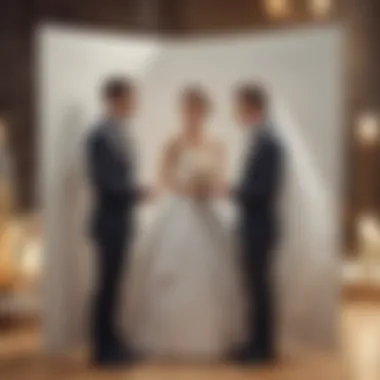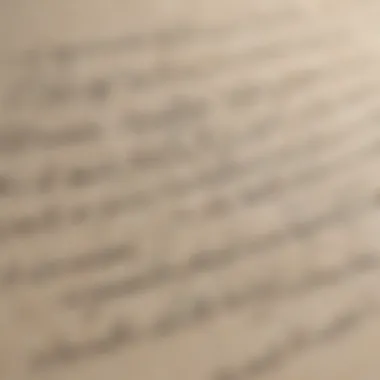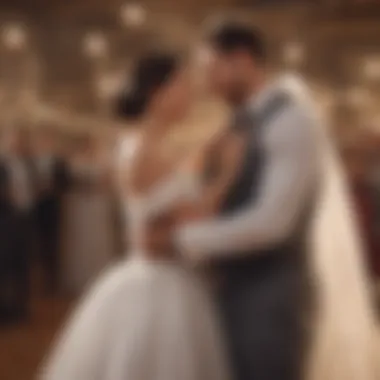Crafting Meaningful Wedding Messages for Every Occasion


Intro
Creating a meaningful wedding message can feel daunting, especially with the myriad of sentiments to convey. Weddings are pivotal occasions filled with joy, love, and celebration. The right words can amplify these emotions, making the message memorable for newlyweds and guests. Touching on various styles—from heartfelt wishes to lighthearted notes—allows us to navigate the complexities of this task.
Understanding the importance of cultural nuances is crucial in shaping your message. Personalization becomes a path to deeper connections, ensuring that the message resonates authentically. The ability to convey genuine emotions through words can forge lasting memories and relationships.
This article aims to equip you with tools for crafting these significant messages. It will cover various techniques and styles suitable for different scenarios, enhancing your confidence and creativity. Together, we will explore the subtleties of expression that define meaningful wedding messages.
Foreword to Wedding Messages
Creating meaningful wedding messages involves more than just stringing words together on a card. It is a form of connection that has lasting effects on both the couple and their guests. In an era where personal touches are valued, thoughtful wedding wishes help to convey one's emotions and sentiments towards the couple on their special day. These messages capture the essence of joy and celebration, making them invaluable for any wedding.
One of the key benefits of crafting personalized wedding messages is their ability to strengthen relationships. A well-crafted message resonates with its recipients. It shows that the sender took time and thought into expressing genuine feelings. This process of reflection fosters deeper connections among family and friends. For couples, receiving heartfelt messages can be uplifting during their wedding, reinforcing their decision to unite in love.
Moreover, thoughtful wedding messages create lasting memories. They serve as reminders of the support and love surrounding the couple during this significant transition in their life. Instead of being mere formalities, these messages have the potential to become treasured keepsakes that couples cherish long after their special day.
The importance of understanding the couple’s background and personality cannot be understated. When crafting a message, it is essential to consider the unique traits of the newlyweds. Whether they are romantic, humorous, or more traditional in outlook, aligning the message with their character adds depth and meaning. This understanding shapes the overall sentiment and ensures that the message will resonate well.
Additionally, the incorporation of cultural nuances in wedding messages can enhance their meaning. Different cultures may hold distinct customs and practices surrounding marriage. Acknowledging these factors within messages demonstrates respect and enhances emotional connections.
In summary, thoughtful wedding messages play a crucial role in celebrating love. They offer a way to articulate emotions, strengthen relationships, and create memories. Taking the time to personalize these messages can have a profound impact, both on the couple and their guests.
Types of Wedding Messages
Wedding messages can encapsulate a wide array of emotions. Selecting the appropriate type of message is crucial for making a lasting impact. Elements like the relationship to the couple, the overall tone of the wedding, and the occasion's formality must be considered. An appropriate message not only conveys your sentiments but also enhances the overall experience of the event.
Each type of wedding message carries its own weight and importance—heartfelt messages express genuine emotion, humorous messages bring lightness to the festivities, formal wishes maintain a respectful tone, and religious blessings invoke deep spiritual connections. Understanding these categories helps in crafting a message that aligns with the couple's unique story and their values.
Heartfelt Messages
Heartfelt messages usually contain the purest intentions. They often reflect genuine well-wishes for the couple's future. To create a heartfelt message, consider incorporating personal insights or fond memories. You might include how the couple inspires you or what their relationship represents. Such messages can evoke emotions, fostering a sense of connection and intimacy in the gathering.
Key elements to include:
- Personal anecdotes
- Well-wishing statements for their future
- Sentiments about love and partnership
For example, one could write:
"From the moment I saw you both together, I knew you were meant for each other. May your life together be filled with joy, love, and adventure."
Humorous Messages
Humorous messages are a delightful way to lighten the mood. They bring laughter and enjoyment, making them particularly fitting for jovial gatherings. However, it’s essential to maintain respect and avoid any potentially offensive jokes. Humor should harmonize with the couple's personalities so that it resonates appropriately.
When crafting humor:
- Avoid inside jokes that might alienate others
- Consider light-hearted nudges rather than criticisms
- Relate humor to shared experiences
A successful humorous message could be:
"Marriage is a relationship in which one person is always right, and the other is the husband! Congratulations!"
Formal Wishes
Formal wishes add a sense of class and elegance to the occasion. They are most suitable for more traditional or upscale weddings, where decorum is essential. These messages should be concise while still encompassing your best wishes for the couple’s journey. An essential aspect is to address the couple appropriately.
Often, formal wishes include characteristics such as:
- Respectful language
- Classic expressions of goodwill
- Proper titles when addressing the couple
An example of a formal wedding message might be:
"Wishing you both a lifetime of happiness and love. May your union be blessed and filled with joy."
Religious Blessings


Religious blessings invoke a deeper spiritual layer, providing the couple with moral support and guidance throughout their marriage. These blessings can vary significantly based on the couple's faith and beliefs. Including a religious aspect could enhance the sentiments expressed.
Considerations when crafting religious messages include:
- Comprehensive understanding of the couple's beliefs
- Tailoring the blessing to fit their spiritual practices
- Using scripture or religious texts if appropriate
A thoughtful example could be:
"May your marriage be blessed with love, faith, and understanding, as written in Ephesians 4:2."
These types of messages serve as a vital part of the wedding experience, allowing individuals to articulate their best wishes in ways that feel authentic and relevant to the couple.
Personalization of Wedding Messages
Personalization is a vital component in crafting wedding messages that truly resonate. It transforms a standard greeting into a memorable sentiment that reflects the unique bond between the sender and the recipients. Personalization not only enhances emotional connection but also shows that you have taken the time to understand the couple's journey. With thoughtful personalization, you create a message that feels genuine and heartfelt, which is the core of what wedding wishes should be about.
When crafting personalized messages, consider the couple's history, shared experiences, and interests. This approach adds depth to your words, making them more impactful. Benefits of personalization include stronger emotional ties, cherished memories, and a message that stands out among the myriad of well-wishes the couple will receive.
Incorporating Personal Stories
One effective way to personalize wedding messages is by incorporating personal stories. Sharing a moment you experienced with the couple showcases warmth and familiarity. For example, you might reflect on how you witnessed their romance develop or a funny encounter that highlights their compatibility. Stories serve as a lens through which others can view the couple's love, hence adding emotional weight to the message.
Your story should be concise yet vivid enough to highlight the essence of the couple’s relationship. This not only makes your message relatable but also helps the couple feel cherished through your personal perspective. Always ensure the story is respectful and reflects the couple positively, as this is a time for celebration.
Using Specific References
Specific references in a wedding message can significantly enhance its meaning. By mentioning shared favorite activities, important places they visited together, or even inside jokes, you create a unique touch that is exclusive to the couple. This makes your message not just another card but a keepsake that reflects their shared journey.
For instance, referencing their first trip together or a memorable party with friends can remind them of joyful moments, enriching the sentiment of your message. It shows that you pay attention to their relationship and values their moments together. Use these references thoughtfully to build an authentic narrative that resonates deeply with the recipients.
Cultural Considerations in Wedding Greetings
When crafting wedding messages, cultural considerations are paramount. Weddings often embody the traditions and values of the couple's heritage, making it critical to respect and acknowledge these elements in your greetings. Understanding the nuances of different cultural practices can enhance the heartfelt nature of your message, ensuring it resonates well with the couple and their families.
The significance of cultural considerations in wedding greetings extends beyond mere politeness; it shows an appreciation for the shared values and rich histories that define the couple's identity. Ignoring these cultural aspects can lead to messages that feel tone-deaf or inappropriate, potentially offending family members or guests. To convey genuine sentiments, it is essential to weave in culturally relevant themes that align with the couple's background.
Understanding Cultural Norms
Before penning your wedding message, it is crucial to familiarize yourself with the cultural norms associated with that particular wedding. Each culture has its own unique rituals, symbols, and language, which inform how best to express your wishes. For example, in many Asian cultures, offering blessings for prosperity and harmony is common, whereas Western cultures may emphasize love and partnership.
Here are key points to consider when understanding cultural norms:
- Customary Greetings: Different cultures have preferred phrases or greetings. Familiarize yourself with these to enhance receptivity.
- Significance of Symbols: Certain symbols may hold special meanings. Understanding these can guide your choice of words.
- Family Involvement: In many cultures, family approval and involvement are essential. Include acknowledgment of family sentiments in your message.
Incorporating these elements into your wedding greetings will not only enhance their meaning but also foster a sense of belonging among attendees.
Adapting Messages for Different Traditions
Once you grasp the cultural norms, you can effectively adapt your wedding messages to suit various traditions. This adaptability is crucial because each wedding may reflect a blend of customs, especially in multicultural contexts. For instance, a couple from diverse backgrounds might appreciate a message that honors both heritages.
Consider the following strategies for tailoring your messages:
- Blend Cultural Elements: If the couple comes from different backgrounds, find ways to honor both. For example, you may use a traditional greeting from one culture followed by a heartfelt wish in the other.
- Respect for Traditions: Acknowledge the couple's specific traditions. Recognizing their commitment to these practices can enrich your message.
- Inclusivity: Use language that is inclusive, allowing everyone, regardless of their cultural background, to feel included in the celebration.
"In respecting diverse traditions, we create a shared space where everyone can celebrate together, reinforcing connections that transcend cultural barriers."
By embracing cultural considerations in wedding greetings, you create messages that are not only meaningful but also enriching for everyone involved, reinforcing the sense of community and shared joy.
Messages for Different Scenarios
Crafting wedding messages for different scenarios is essential for conveying the appropriate sentiments. Every relationship is unique, and tailoring your message to the recipient enhances its significance. Whether the person is a close friend, a relative, or just an acquaintance, understanding the dynamics of each relationship can create more meaningful interactions.
The consideration of the recipient's role in the couple's lives can direct the tone and content of the message. Close friends may appreciate eloquent personal stories, while relatives might expect a blend of formality and warmth. Acquaintances usually benefit from more straightforward and polite messages. This section will delve into how to navigate these scenarios and ensure that each message reflects the nature of your relationship with the couple.


Messages for Close Friends
When crafting messages for close friends, it is critical to infuse personal anecdotes and shared memories. Close friends often share deep connections with the couple, and your message should reflect that bond. This is an opportunity to celebrate not only the union but also the journey that led them to this day.
Consider including specific references to experiences you’ve shared. For example:
- Mention memorable trips together.
- Recall inside jokes that encapsulate your friendship.
- Highlight their strengths, such as love, loyalty, or humor.
Such elements can create a message that feels genuine and heartfelt. Using a more casual tone may suit this type of relationship, as it mirrors the nature of your friendship. Here is an example message:
"Congratulations on your special day! I still remember our trip to New York, where you both showed how perfect you’re for each other. Wishing you both endless happiness and adventures together!"
Messages for Relatives
Messages for relatives often require a careful balance between formality and affection. In many cultures, relatives hold significant roles in the lives of the couple, possibly serving as examples of long-lasting relationships. A thoughtful message to relatives can honor family traditions while also imparting personal warmth.
Incorporating a blend of formal wording, along with familial affection, can be effective. Consider these aspects:
- Use respectful language that signifies your relationship.
- Mention family lineage or shared values.
- Provide blessings or hopes that reflect your desires for their future.
An example of such a message might be:
"Dear [Couple's Names], congratulations! It warms my heart to see you begin this journey together. May your life be filled with joy and the same strength of love that our family holds dear."
Messages for Acquaintances
When addressing acquaintances, the approach can be more straightforward. These messages should remain polite and celebratory without diving too deeply into personal sentiments. The intent here is to convey well-wishes that acknowledge the couple’s commitment without getting overly familiar.
When composing messages for acquaintances, consider the following tips:
- Keep it concise and respectful.
- Focus on general well-wishes rather than personal anecdotes.
- Employ a warm yet neutral tone that does not seem forced.
A suitable example could look like this:
"Wishing you both a lifetime of love and happiness! Congratulations on your wedding day!"
By understanding the dynamics of your relationships with the couple, you can craft messages that resonate well. This attentiveness showcases your sincerity and your investment in their happiness.
Incorporating Quotes and Poems
Incorporating quotes and poems into wedding messages can add depth and resonance. This technique allows people to capture emotions elegantly while providing a connection to universal themes of love and commitment. Using well-chosen words can elevate a simple message and bring it into a realm of shared experience. Whether crafted by beloved authors or a few heartfelt lines from the sender, quotes and poems serve as conduits for feelings that may otherwise be difficult to articulate.
When drawing on existing quotes or employing poetic language, several elements are crucial. First, relevance is paramount. The selected piece must resonate with the couple's journey or the significance of their union. Secondly, the intention behind using such language should be clear. A quote might reflect hopes for the couple's future or commemorate their past. This intentionality enhances the overall message, making it more than just words on paper but a thoughtful tribute to their love.
Additionally, consider the tone of the words you include. Are they light-hearted, serious, or romantic? The right tone can mirror the nature of the relationship you have with the couple and ensures that your message aligns with their style.
> "A beautiful thing is never perfect."
This quote reminds us that love, with all its intricacies, holds beauty even in its flaws.
In summary, incorporating quotes and poems provides a meaningful layer to wedding messages. It offers both the sender and receiver a more profound connection to the emotions celebrated during such an event.
Selecting Relevant Quotes
Choosing the right quote requires a careful consideration of the couple’s unique characteristics and shared experiences. A relevant quote can encapsulate the essence of their relationship or highlight their journey together. When picking a quote, aim for one that aligns with the couple’s values or experiences. This mirrors their personality and satisfies their beliefs.
Sources for Quotes:
Although many famous quotes exist, don’t overlook the possibility of using lesser-known quotes from personal sources such as friends or family. This option adds more intimacy to your message.
Here are some tips on selecting quotes:
- Consider the couple's history: Think of moments they treasure.
- Stay away from overly common phrases: Choose something unique that reflects their relationship.
- Check the source: Ensure the quote comes from a reliable author or well-known context.
Utilizing Poetry to Convey Emotions
Poetry can be a powerful tool to express emotions concisely and artistically. Unlike prose, poetry packs a punch with fewer words but can capture complex feelings beautifully. If you are inclined, it's worth exploring original poetry. A few lines written personally can resonate deeply with the couple. However, if this is daunting, using established poems can also deliver the sentiment effectively.


When writing or selecting a poem, focus on:
- Emotional resonance: Utilize lines that stir feelings related to love, unity, and hope.
- Simplicity: The language should flow smoothly; avoid complex phrases that may dilute the message.
- Structure: A small stanza or a couplet can be sufficient to convey meaningful thoughts without overwhelming.
Utilizing poetry elevates a wedding message, crafting a memorable piece full of emotional depth.
Crafting Your Message
Crafting your wedding message is a crucial step that can often determine how your words resonate with the couple and their guests. A carefully thought-out message can convey genuine emotions, foster connections, and enhance the overall experience of the wedding celebration. As you create your message, consider the couple's personalities, the nature of your relationship with them, and the message's tone. This attention to detail elevates simple greetings into heartfelt communications that can be cherished for years.
Choosing the Right Tone
The tone of your wedding message sets the stage for how your sentiments will be received. A well-chosen tone reflects not only your feelings but also honors the couple's unique relationship. Here are some things to consider:
- Familiarity with the couple: If you are close to the couple, a warm, personal tone is appropriate. Share a memory or an inside joke that encapsulates your feelings toward them.
- Understanding the event: A formal wedding may call for a more traditional or respectful tone, while a relaxed venue suggests a casual approach. Adjust your wording accordingly.
- Avoiding clichés: Strive for originality in your expression. Phrases like "happily ever after" can feel generic and uninspired. Instead, articulate what makes the couple special.
Being mindful of these aspects will allow your message to resonate deeply.
Designing the Flow of the Message
The structure of your message is as important as its content. A well-organized message fosters clarity and ensures that your main thoughts shine through clearly. To effectively design the flow of your message, consider these guidelines:
- Start with a greeting: Open with a heartfelt greeting that directly addresses the couple. Use their names to personalize the message. For instance, "Dear Sarah and Tom" is more engaging than a simple "To the newlyweds."
- Middle section for warm wishes: This is where you articulate your hopes and feelings for the couple. A few sentences about their relationship and what brought them to this moment will strengthen your message. It can include wishes for happiness, love, and joy.
- Closing thoughts: End with a closing that ties your message together. This could be a reiteration of your happiness for them or an invitation to celebrate together.
A well-structured message flows naturally and enhances the emotional impact of your words.
"A great wedding message resonates with love and understanding, reflecting the joy of the occasion and the significance of the couple’s journey together."
By paying attention to the tone and structure of your message, you create something that stands out and fills the day with even more joy.
Final Touches on Your Wedding Message
A well-crafted wedding message can have a lasting impact, but it is essential to consider the final touches that will elevate your message from ordinary to exceptional. This section delves into two crucial components of finalizing your wedding greetings: proofreading for clarity and formatting your message. By addressing these elements, you not only ensure that your message is polished but also enhance its readability and emotional resonance.
Proofreading for Clarity
Proofreading is a vital step in writing any message, especially one as significant as a wedding wish. It may seem trivial, but errors or unclear phrasing can divert the sender's intent. Take a moment to read your message aloud. This simple practice will help identify awkward sentences or typos that might have slipped through unnoticed. A clear message makes your intentions more evident and ensures that the couple can fully appreciate your sentiments.
Focus on these key areas while proofreading:
- Spelling and Grammar Errors: Check for common mistakes. Simple errors can undermine your message's sincerity.
- Clarity of Thought: Ensure your ideas are coherent. Each sentence should lead to the next logically.
- Tone Consistency: Make sure the tone you set at the beginning remains throughout the message.
Taking the time to meticulously proofread can transform a hastily written message into a meaningful tribute.
Formatting Your Message
The way your message is presented plays a significant role in its overall impact. Effective formatting aids readability and reflects care and effort in crafting your wishes. Here are some formatting tips to consider:
- Use Paragraphs Wisely: Break long messages into paragraphs. Each paragraph can cover a unique aspect of your message, making it easier to digest.
- Highlight Key Phrases: Utilizing bold text for crucial sentiments can draw the couple's attention to your main points. This serves to emphasize your feelings.
- Choose Appropriate Fonts and Sizes: If you are writing it out by hand, ensure your handwriting is legible. For typed messages, select a font that is easy to read, avoiding overly stylized scripts that might detract from your message.
"A well-formatted message signifies the care and thought behind the words, making the sentiment more profound."
Formatting may seem like a minor detail, but it contributes significantly to the perception of your message. In sum, giving attention to the final touches of your wedding message not only reflects your respect for the couple but also solidifies the connection you're aiming to foster. Your thoughtful engagement can leave a mark that resonates well beyond the wedding day.
Finale
The Lasting Impact of a Meaningful Message
In the realm of wedding messages, clarity and thoughtfulness are paramount. A meaningful message can resonate well beyond the day of the wedding. It can become a cherished memory for the couple, something they revisit in years to come.
There are several important aspects to consider:
- Emotional Resonance: A carefully crafted message conveys feelings of love, joy, and hope, offering the couple a deeper understanding of their relationships with family and friends.
- Personal Touch: Including specific anecdotes or references adds a layer of personalization. It shows that the sender has invested time and thought into the message, making it memorable.
- Cultural Sensitivity: Understanding the couple's cultural background allows for tailored messages that respect traditions while still conveying heartfelt sentiments.
"The true measure of a wedding message lies not in its grandeur but in its authenticity. "
Crafting a thoughtful closing can provide closure and encapsulate the feelings that were expressed throughout the wedding. It also sets a tone for the couple's new journey together, making it essential to reflect on the shared dreams and aspirations.
In summary, the conclusion of a wedding message is not merely a formality. It holds the power to cement relationships, create lasting memories, and ultimately shape the way love stories are remembered. As such, taking care to articulate this part effectively enhances the overall impact of the message.



